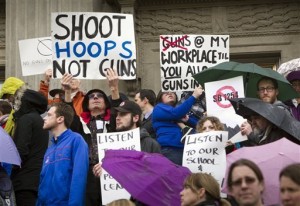FOR IMMEDIATE RELEASE
Students for Concealed Carry Sues Ohio State University
(Columbus, Ohio) – July 7, 2014 – This week Students for Concealed Carry Foundation, Inc. filed a lawsuit in Franklin County Common Pleas Court challenging The Ohio State University’s authority to ban lawful possession of firearms by students, faculty, staff, and other affiliates on its campuses.
The group, joined by Ohioans for Concealed Carry, believes that Ohio State’s campus gun ban unlawfully infringes on fundamental Constitutional Rights. It also disarms students to and from campus, leaving them vulnerable to violent crime on their commute in what is historically a high crime area, the University District. While Ohio law permits a concealed handgun licensee to store a firearm in a motor vehicle on OSU’s campuses, a student could face administrative sanctions from the university including expulsion due to the certain provisions in the Student Code of Conduct.
Michael R. Moran, a Columbus attorney representing the groups, points out that expulsion from Ohio State for a firearms related incident carries severe consequences for a law-abiding student including an academic record blemish that “can virtually guarantee the disciplined student may never earn an accredited degree.”
Moran is joined by attorney Derek DeBrosse of Barney DeBrosse, LLC who stated “The Ohio Revised Code is clear that the legislature retains sole authority to regulate the possession of firearms.” He added that “Ohio State’s policies are in direct violation of the law.”
Trial date is set for July 14, 2015.
The complaint as filed can be accessed here.
– 30 –
Derek A. DeBrosse, Esq., Barney DeBrosse, LLC can be reached at derek@barneydebrosse.com or 614.326.1919.
Michael R. Moran, Esq., Michael R. Moran Co., LPA can be reached at mrmoran@mrmoran.com or 614.476.6453.
CONTACT:
Zachary Zalneraitis
Director of Public Relations
Students for Concealed Carry
Zachary.Zalneraitis@ConcealedCampus.org
——————————————————
Students for Concealed Carry Foundation, Inc. is a nationwide, non-partisan student organization founded to perform scholarly legal and public policy research, to educate the public concerning issues of civil liberties pertaining to firearms at postsecondary educational institutions through conferences and other media, and to engage in legal action when necessary to fulfill the objectives of the organization.
Ohioans for Concealed Carry, founded in 1999, is an all-volunteer, grassroots organization dedicated to preserving and expanding the rights of all law-abiding gun owners in Ohio.



